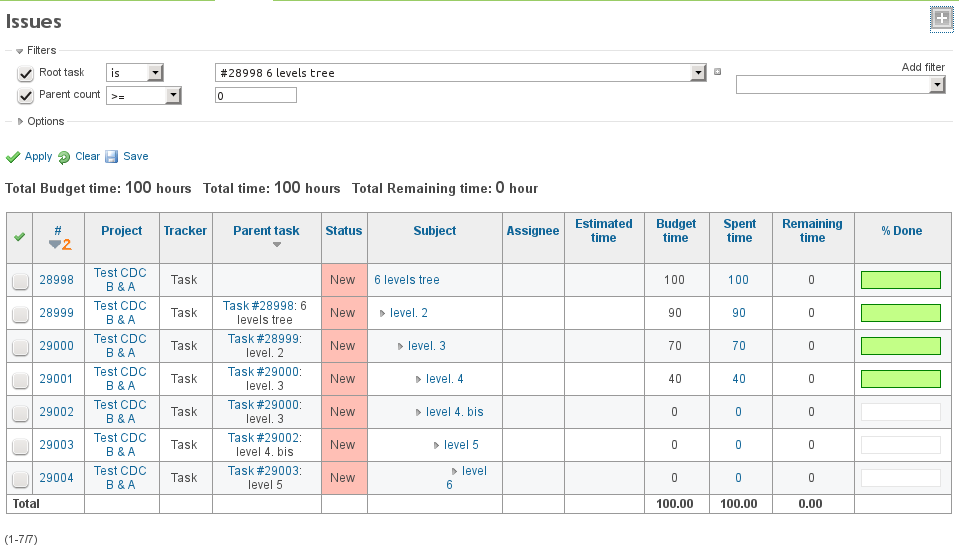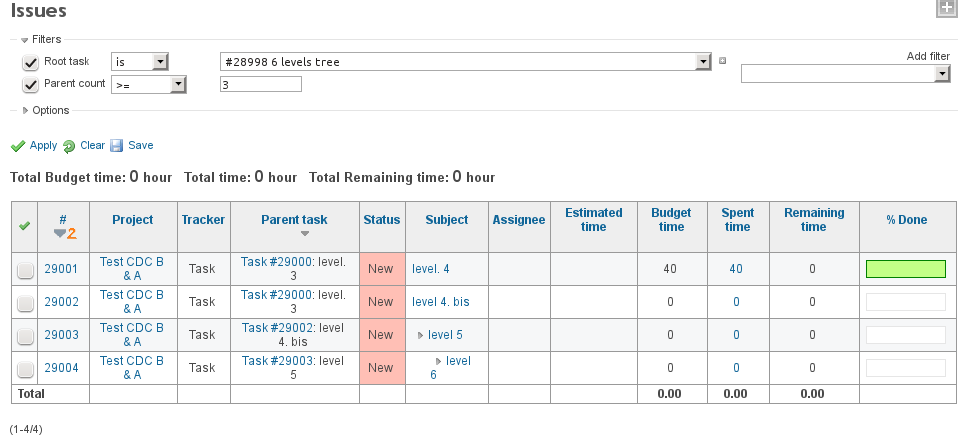Actions
Feature #15861
openIssues, Filter 'number of parents'
Status:
New
Priority:
Normal
Assignee:
-
Category:
Issues
Target version:
-
Resolution:
Description
The aim is to be able to filter on a sub-tree, in projects with a deep tree.
Files
 Updated by Jérôme BATAILLE about 12 years ago
Updated by Jérôme BATAILLE about 12 years ago
Only 4 things have to be done :
# 1) Add this method in the Issue query model
def sql_for_parent_count_field(field, operator, value)
# db_table empty
db_field = "( #{Issue.table_name}.#{Issue.left_column_name} - (SELECT #{Issue.left_column_name} FROM #{Issue.table_name} AS issues_root WHERE issues_root.id = #{Issue.table_name}.root_id AND issues_root.parent_id IS NULL) )"
sql_for_field(field, operator, value, '', db_field)
end
# 2) Enhance the sql_for_field method (C.f.: ENHANCEMENT HERE)
#
# Helper method to generate the WHERE sql for a +field+, +operator+ and a +value+
def sql_for_field(field, operator, value, db_table, db_field, is_custom_filter=false)
sql = ''
case operator
when "="
if value.any?
case type_for(field)
when :date, :date_past
sql = date_clause(db_table, db_field, (Date.parse(value.first) rescue nil), (Date.parse(value.first) rescue nil))
when :integer
# ENHANCEMENT HERE : manage case where db_table param is not provided
db_table_and_field = (db_table.present? ? "#{db_table}.#{db_field}" : "#{db_field}")
if is_custom_filter
sql = "(#{db_table_and_field} <> '' AND CAST(CASE #{db_table_and_field} WHEN '' THEN '0' ELSE #{db_table_and_field} END AS decimal(30,3)) = #{value.first.to_i})"
else
sql = "#{db_table_and_field} = #{value.first.to_i}"
end
when :float
if is_custom_filter
sql = "(#{db_table}.#{db_field} <> '' AND CAST(CASE #{db_table}.#{db_field} WHEN '' THEN '0' ELSE #{db_table}.#{db_field} END AS decimal(30,3)) BETWEEN #{value.first.to_f - 1e-5} AND #{value.first.to_f + 1e-5})"
else
sql = "#{db_table}.#{db_field} BETWEEN #{value.first.to_f - 1e-5} AND #{value.first.to_f + 1e-5}"
end
else
sql = "#{db_table}.#{db_field} IN (" + value.collect{|val| "'#{connection.quote_string(val)}'"}.join(",") + ")"
end
else
# IN an empty set
sql = "1=0"
end
when "!"
if value.any?
sql = "(#{db_table}.#{db_field} IS NULL OR #{db_table}.#{db_field} NOT IN (" + value.collect{|val| "'#{connection.quote_string(val)}'"}.join(",") + "))"
else
# NOT IN an empty set
sql = "1=1"
end
when "!*"
# ENHANCEMENT HERE : manage case where db_table param is not provided
db_table_and_field = (db_table.present? ? "#{db_table}.#{db_field}" : "#{db_field}")
sql = "#{db_table_and_field} IS NULL"
sql << " OR #{db_table_and_field} = ''" if is_custom_filter
when "*"
db_table_and_field = (db_table.present? ? "#{db_table}.#{db_field}" : "#{db_field}")
sql = "#{db_table_and_field} IS NOT NULL"
sql << " AND #{db_table_and_field} <> ''" if is_custom_filter
when ">="
if [:date, :date_past].include?(type_for(field))
sql = date_clause(db_table, db_field, (Date.parse(value.first) rescue nil), nil)
else
# ENHANCEMENT HERE : manage case where db_table param is not provided
db_table_and_field = (db_table.present? ? "#{db_table}.#{db_field}" : "#{db_field}")
if is_custom_filter
sql = "(#{db_table_and_field} <> '' AND CAST(CASE #{db_table_and_field} WHEN '' THEN '0' ELSE #{db_table}.#{db_field} END AS decimal(30,3)) >= #{value.first.to_f})"
else
sql = "#{db_table_and_field} >= #{value.first.to_f}"
end
end
when "<="
if [:date, :date_past].include?(type_for(field))
sql = date_clause(db_table, db_field, nil, (Date.parse(value.first) rescue nil))
else
# ENHANCEMENT HERE : manage case where db_table param is not provided
db_table_and_field = (db_table.present? ? "#{db_table}.#{db_field}" : "#{db_field}")
if is_custom_filter
sql = "(#{db_table_and_field} <> '' AND CAST(CASE #{db_table_and_field} WHEN '' THEN '0' ELSE #{db_table_and_field} END AS decimal(30,3)) <= #{value.first.to_f})"
else
sql = "#{db_table_and_field} <= #{value.first.to_f}"
end
end
when "><"
if [:date, :date_past].include?(type_for(field))
sql = date_clause(db_table, db_field, (Date.parse(value[0]) rescue nil), (Date.parse(value[1]) rescue nil))
else
# ENHANCEMENT HERE : manage case where db_table param is not provided
db_table_and_field = (db_table.present? ? "#{db_table}.#{db_field}" : "#{db_field}")
if is_custom_filter
sql = "(#{db_table_and_field} <> '' AND CAST(CASE #{db_table_and_field} WHEN '' THEN '0' ELSE #{db_table_and_field} END AS decimal(30,3)) BETWEEN #{value[0].to_f} AND #{value[1].to_f})"
else
sql = "#{db_table_and_field} BETWEEN #{value[0].to_f} AND #{value[1].to_f}"
end
end
when "o"
sql = "#{queried_table_name}.status_id IN (SELECT id FROM #{IssueStatus.table_name} WHERE is_closed=#{connection.quoted_false})" if field == "status_id"
when "c"
sql = "#{queried_table_name}.status_id IN (SELECT id FROM #{IssueStatus.table_name} WHERE is_closed=#{connection.quoted_true})" if field == "status_id"
when "><t-"
# between today - n days and today
sql = relative_date_clause(db_table, db_field, - value.first.to_i, 0)
when ">t-"
# >= today - n days
sql = relative_date_clause(db_table, db_field, - value.first.to_i, nil)
when "<t-"
# <= today - n days
sql = relative_date_clause(db_table, db_field, nil, - value.first.to_i)
when "t-"
# = n days in past
sql = relative_date_clause(db_table, db_field, - value.first.to_i, - value.first.to_i)
when "><t+"
# between today and today + n days
sql = relative_date_clause(db_table, db_field, 0, value.first.to_i)
when ">t+"
# >= today + n days
sql = relative_date_clause(db_table, db_field, value.first.to_i, nil)
when "<t+"
# <= today + n days
sql = relative_date_clause(db_table, db_field, nil, value.first.to_i)
when "t+"
# = today + n days
sql = relative_date_clause(db_table, db_field, value.first.to_i, value.first.to_i)
when "t"
# = today
sql = relative_date_clause(db_table, db_field, 0, 0)
when "ld"
# = yesterday
sql = relative_date_clause(db_table, db_field, -1, -1)
when "w"
# = this week
first_day_of_week = l(:general_first_day_of_week).to_i
day_of_week = Date.today.cwday
days_ago = (day_of_week >= first_day_of_week ? day_of_week - first_day_of_week : day_of_week + 7 - first_day_of_week)
sql = relative_date_clause(db_table, db_field, - days_ago, - days_ago + 6)
when "lw"
# = last week
first_day_of_week = l(:general_first_day_of_week).to_i
day_of_week = Date.today.cwday
days_ago = (day_of_week >= first_day_of_week ? day_of_week - first_day_of_week : day_of_week + 7 - first_day_of_week)
sql = relative_date_clause(db_table, db_field, - days_ago - 7, - days_ago - 1)
when "l2w"
# = last 2 weeks
first_day_of_week = l(:general_first_day_of_week).to_i
day_of_week = Date.today.cwday
days_ago = (day_of_week >= first_day_of_week ? day_of_week - first_day_of_week : day_of_week + 7 - first_day_of_week)
sql = relative_date_clause(db_table, db_field, - days_ago - 14, - days_ago - 1)
when "m"
# = this month
date = Date.today
sql = date_clause(db_table, db_field, date.beginning_of_month, date.end_of_month)
when "lm"
# = last month
date = Date.today.prev_month
sql = date_clause(db_table, db_field, date.beginning_of_month, date.end_of_month)
when "y"
# = this year
date = Date.today
sql = date_clause(db_table, db_field, date.beginning_of_year, date.end_of_year)
when "~"
sql = "LOWER(#{db_table}.#{db_field}) LIKE '%#{connection.quote_string(value.first.to_s.downcase)}%'"
when "!~"
sql = "LOWER(#{db_table}.#{db_field}) NOT LIKE '%#{connection.quote_string(value.first.to_s.downcase)}%'"
else
raise "Unknown query operator #{operator}"
end
return sql
end
# 3) Add a new filter in initialize_available_filters
add_available_filter 'parent_count', :type => :integer
# 4) Add a new label in the localization files :
field_parent_count: Parent count
 Updated by Jérôme BATAILLE about 12 years ago
Updated by Jérôme BATAILLE about 12 years ago
- File parent_count_filter_all.png parent_count_filter_all.png added
- File parent_count_filter_level_3.png parent_count_filter_level_3.png added
Example (Filter on root task is specific to our Redmine version) :


 Updated by Jérôme BATAILLE over 11 years ago
Updated by Jérôme BATAILLE over 11 years ago
Hi, any chance this patch could be reviewed ?
Actions